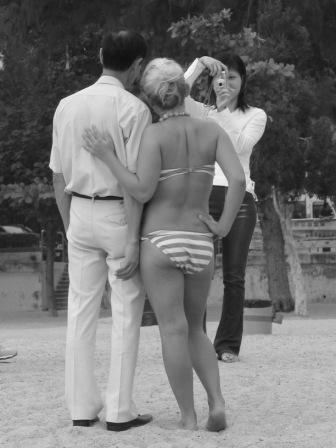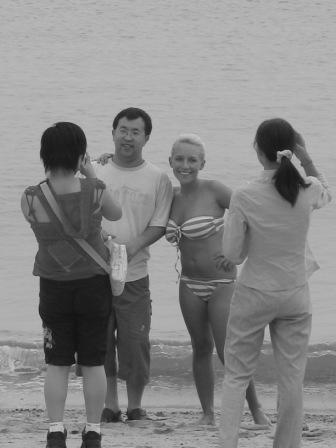Semester at Sea Fall
2006 Voyage 
- Home Page
- My bio
- Multisited Ethnography Project
- Shipboard Interview with Dana
Saign
- An Interview in Reverse in Japan
- Being A Participant Observer
in Hong Kong
- A Flip of a Switch in Burma
- A Renegotiation of Identity in
Vietnam
- An Encounter with a Child in
India
- Religious Conflict: A Resolution in Sight?
- Finding Humor in Croatia
- Open Letter
Being a
Participant Observer in Hong Kong
By Allie D'Amanda
My friend Ashley
and I spent our whole time in Hong Kong instead of going to
 My day of
relaxation and silent observation did not turn out as planned. On the beach, I took off my bathing suit
cover-up, adjusted my bikini, and laid out my towel. Even before I
could close
my eyes and feel the sea breeze on my face, I had a cluster of people
with the cameras
staring and pointing at me. I tried to
pretend I hadn’t seen them, but soon an old man came toward me and with
a
wrinkled hand, held his camera up to his face and clicked a picture. I smiled and reluctantly got up, but stood
beside him and motioned for him to pass his camera to Ashley so that
she could
take a picture of us together. He was so
excited that I thought he might loose his balance and fall on the
uneven
sand. I smiled and noticed how kind his
face was.
My day of
relaxation and silent observation did not turn out as planned. On the beach, I took off my bathing suit
cover-up, adjusted my bikini, and laid out my towel. Even before I
could close
my eyes and feel the sea breeze on my face, I had a cluster of people
with the cameras
staring and pointing at me. I tried to
pretend I hadn’t seen them, but soon an old man came toward me and with
a
wrinkled hand, held his camera up to his face and clicked a picture. I smiled and reluctantly got up, but stood
beside him and motioned for him to pass his camera to Ashley so that
she could
take a picture of us together. He was so
excited that I thought he might loose his balance and fall on the
uneven
sand. I smiled and noticed how kind his
face was.
As soon as I had taken the picture with him, he waved at the rest of the people he was with and beckoned them to come over. For the next five minutes I took pictures with everyone in his group: by the water, next to a sandcastle, by the lifeguard stand, with the mountains in the background, with the town in the background, any and every scene they could think of. I felt like a celebrity. By the end, not even upset that my intended “quiet-time” was disrupted, and I laughed, because once again I had deviated from my day’s plan and was left more satisfied than I thought possible.
 So why was I so
concerned about preserving my privacy and why was I annoyed that my
personal
realm was disrupted? For some reason I
thought that even being in another country I would be able to
“disappear” like
I do at home. But I did not take into
account that I am not only different in appearance, but what is normal
for me
is not necessarily normal for the people in this culture.
I was wearing a bathing suit that was not
modest, and I was the only one on the beach with blonde hair and blue
eyes. There
was no real way for me to “fit in.” Just
as I like to study people who are different than I am, I forget that I
am just
as different to them.
So why was I so
concerned about preserving my privacy and why was I annoyed that my
personal
realm was disrupted? For some reason I
thought that even being in another country I would be able to
“disappear” like
I do at home. But I did not take into
account that I am not only different in appearance, but what is normal
for me
is not necessarily normal for the people in this culture.
I was wearing a bathing suit that was not
modest, and I was the only one on the beach with blonde hair and blue
eyes. There
was no real way for me to “fit in.” Just
as I like to study people who are different than I am, I forget that I
am just
as different to them.
Even though I could not communicate with them through speech, we found a connection through our mutual interest in each other. My focus turned from pleasing myself to pleasing others. I went from “people-watching” to having people watch me. Although I first felt uncomfortable, I created more of a connection with my group of observers because they engaged me! Gerry Tierney felt similar when she says in her essay “Becoming a Participant Observer,”
At first, my primary activity was just hanging out. I was usually quite comfortable doing so and I watched every little things, always listening to the sounds of the street, a world that was slowly opening up to me…The only time I felt uncomfortable was when the tables were turned and people on the street took to watching me (10).
I can relate to
Tierney here, and like she says later, after she began engaging in
conversations with people, she developed much more rewarding
relationships with
people. I hope to take this encounter on
the beach in